Content
Sowing in January for seedlings should be those flowers and vegetables in which development occurs over a long period. Winter is the time for growing greenery on the windowsill. It's time to start breeding berry crops.
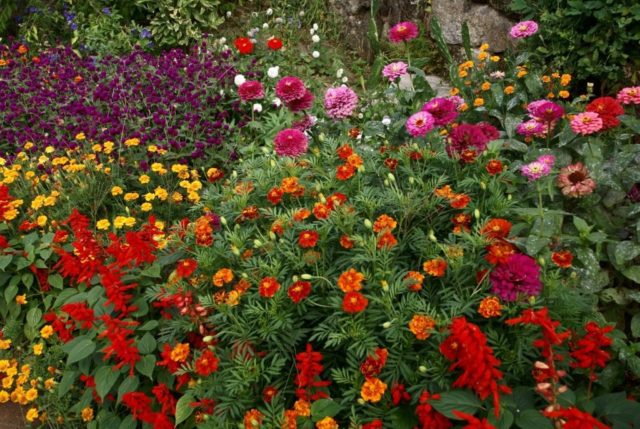
Summer flowers will decorate the flowerbed in May, if the seedlings are grown early
Pros and cons of early landing
By sowing various flowers in January, they get unique specimens for decorating the garden. Sowing vegetable and flower crops in January has its own positive features:
- vegetables ripen in early summer;
- seedlings are strong and resistant;
- growing unique flowers through seedlings is cheaper;
- plants from seedlings bloom longer and much more luxuriant than those sown in the ground;
- the flower garden is more orderly, since the seedlings are larger than the emerging weeds.
It is necessary to mention the disadvantages of sowing flowers in January for seedlings:
- a laborious process takes time;
- the need for horizontal planes for containers with seedlings;
- installation of devices for additional lighting;
- installation of air humidifiers so that young plants do not dry out from the heat coming from the battery;
- the seedlings on the windowsills are protected from the cold on frosty days.
What vegetables are planted for seedlings in January
Vegetables sown for seedlings in January will delight you with an early harvest. The first of these crops is celery, the full development cycle of which is more than 5 months. Propagated by seedlings of root and petiole species. Seeds of fruitful potatoes are also sown in the middle of winter, laid out in peat tablets. They begin to grow early seedlings of late varieties of peppers, eggplants, and unique late tomatoes. All other varieties that mature in the early to mid-term are sown much later or, if grown in heated greenhouses, are planted from the beginning of April. Another crop that needs to be grown since January is onion, leek and nigella.
What greens to sow in January for seedlings
A winter window sill is a good place for growing vitamin greens. In containers with a small amount of soil or other nutrient medium, nigella is sown to collect tender young feathers, parsley, celery, cilantro and dill. In order for all cultures to be sufficiently developed, the daylight hours are extended to 13-14 hours.
The cultivation of the so-called microgreen is spreading:
- paper napkins or hydrogel are laid out on a wide flat plate, which should be constantly wet;
- seeds of any vegetable crops are poured on top - watercress, cabbage, Swiss chard, beets, mustard, salads, onions, arugula;
- small green seedlings are cut off after 10-12 days.
To constantly receive vitamin greens, the process is repeated in different containers after 7-10 days.
What berries to plant in January for seedlings
In the middle of winter, in January, you can plant various berry crops on seedlings - strawberries, wild strawberries and raspberries. Berry seeds with a hard top layer are first kept in warm water for several hours, and then dried and treated with growth stimulants. The best substrate for seedlings is sand, humus and garden soil. To ensure that the seeds of berry crops germinate, they are stratified by placing them in a refrigerator for 30-50 days.From the substrate transferred to the heat, the sprouts appear on the 12-20th day, sometimes later. Shoots with 2 true leaves dive into separate containers. They are transplanted into open ground with heat. Growing strawberries according to this algorithm, they get a harvest by the end of July or in August.
What flowers to plant in January
The seeds of your favorite flowers are disinfected. Then, according to the instructions, they are treated with Epin, Zircon, HB-101 or others.
Carnation Shabo
The culture is sown in winter, in June they get luxurious inflorescences. Now many terry varieties with different colors of petals have been bred. Seeds are laid out on the soil, sprinkled with sand on top. A film or glass is placed on the container until sprouts appear. The culture is drought-resistant and sun-loving, prefers to grow in dry areas, without stagnant water.
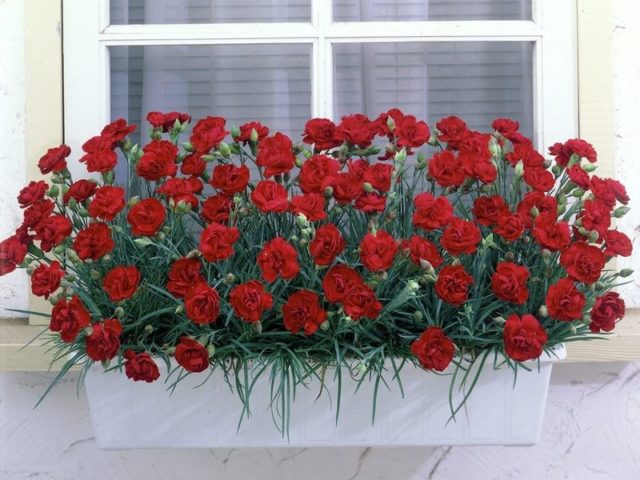
Carnation Shabo blooms almost six months after the appearance of seedlings
Viola
The bright flowers of the pansies will show their lush bloom in May if the seeds are sown for seedlings in January. For good shoots, snow is applied to the substrate and the entire mass is slightly compacted. Small grains are spread over the snow. When melting, the seeds are carried deep into the soil and then germinate in the substrate.
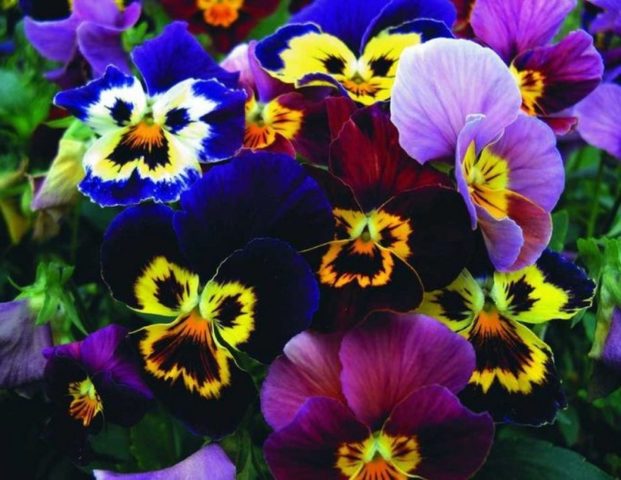
Viola is also called Vittrock's violet.
Aquilegia
Airy, dancing flowers of elves - the multi-colored aquilegia develops well in the sun in the middle lane. In the southern regions, plants are planted in semi-shaded areas and watering is regularly monitored. Seeds sown on a fertile substrate are lightly sprinkled with sand. The container in the bag is placed in the refrigerator or buried under the snow for 30-45 days. In February, early March, the container is transferred to a warm place, and the aquilegia sprouts quickly.
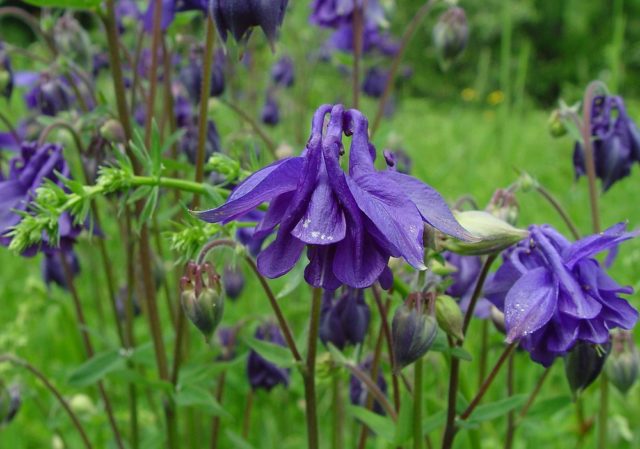
When working with the seeds of the catchment, it must be remembered that they contain toxic substances
Eustoma
Irish rose, or gourmet eustoma, takes up to 6 months to form buds. January is a good time to plant a crop. Seeds are scattered over the soil surface, lightly covered with sand on top. When using peat tablets, the grains are gently pressed into the substrate swollen from moisture.
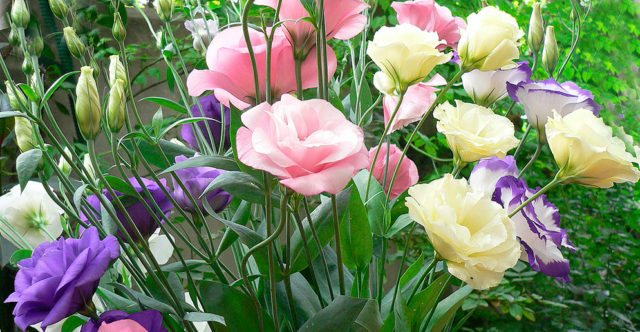
The plant requires artificial lighting for at least 13 hours a day.
Pelargonium
The popular flower amazes with many varieties and colors of petals. The zonal species is sown in January; as a result of careful care of the seedlings, ornamental plants are obtained to decorate the garden by the beginning of June. The seedlings are always placed in the sun. Taking care that the bush is covered with lush flowering caps, they constantly pinch the shoots growing up, water and loosen the soil abundantly. Pelargonium grains are large, they must be sprinkled with soil and slightly compacted. Sprouts sprout in a week.
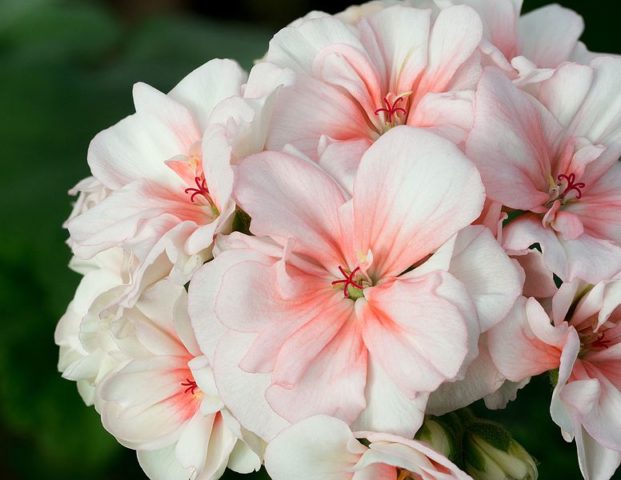
To keep the stems of pelargonium strong and durable, provide long daylight hours
Lavender
Lavender seeds take a very long time to germinate. Success in the propagation of essential oil crops is achieved by those gardeners who stratify the seed from January, laying the container in a plastic bag in the refrigerator or under the snow for 45-60 days. At the end of February, the container is brought into the heat, the sprouts appear after 12 days. Lavender seedlings are planted in a sunny area where there is some sand, clay and stones. Lavender will not develop on acidic soils, it prefers alkaline soils.
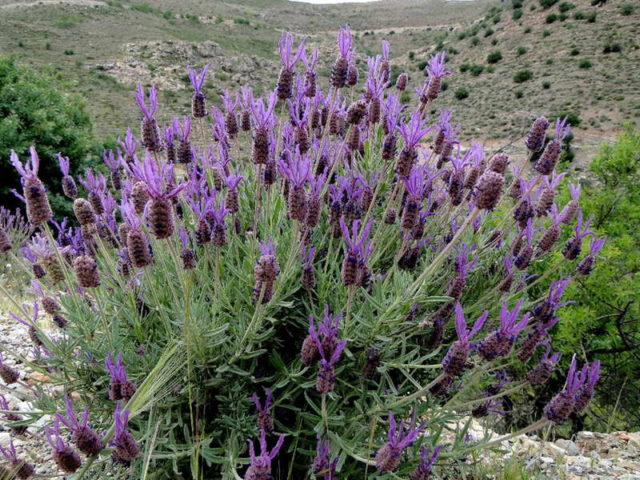
Lavender is not often watered, the shrub develops better in a dry area
Verbena
Verbena seedlings develop for a long time. For early bud formation, by June, hybrid vervain is sown in January. Seedlings are shown in 2-3 weeks and later. Before sowing, the seeds are treated with stimulants.The culture needs moderate watering and a sunny area, since verbena is drought-resistant. The multi-colored buds continue to form until late autumn.
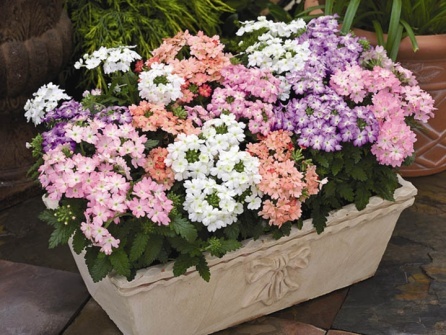
Verbena hybrid creates beautiful kaleidoscopes in any flower bed
Primrose
The grains of a tug-like culture are very small, they are simply scattered over the substrate. Then sprinkle with snow. In January, the container is refrigerated for 20-30 days. In mid-February, early March, the containers are transferred to the heat, seedlings appear in 14-25 days.
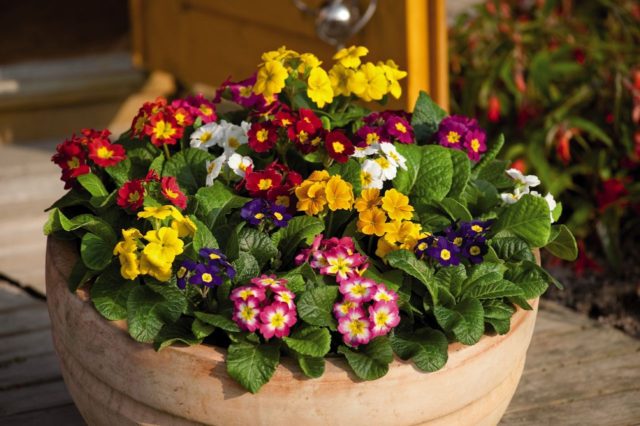
Experienced gardeners recommend adding a third of vermiculite and perlite to the primrose substrate.
Delphinium
Before sowing, delphinium seeds are soaked in a stimulator and stratified for a month. Delphiniums develop better in sunny areas, prefer fertile loams with a neutral reaction. Plants are watered regularly, but it is a drought tolerant crop. For lush flowering, fertilizing is required.
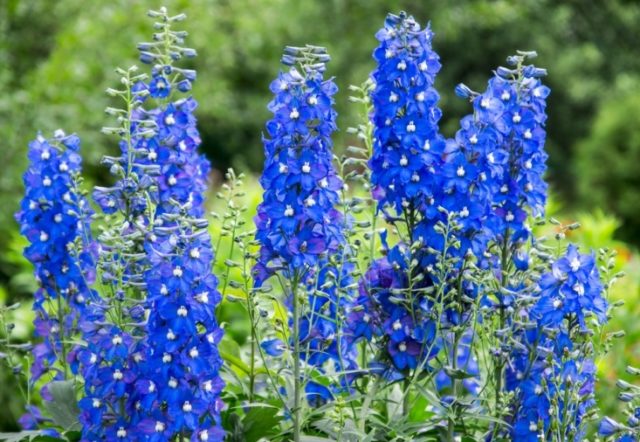
The multi-colored candles of the hybrid delphinium will bloom in late June if the crop is sown in January
Lobelia
Graceful lobelia flowers of various colors are obtained from seedlings, which begin to grow in January. Seedlings appear in 9-12 days. Many delicate seedlings die during the cotyledon formation phase. Seeds are scattered over the substrate, the container is covered with a film or glass on top, always shading from direct sunlight. Seedlings develop very slowly, the time before bud formation is at least 70-90 days. Delicate flower culture is demanding for sufficient light at the age of seedlings and moderate watering.
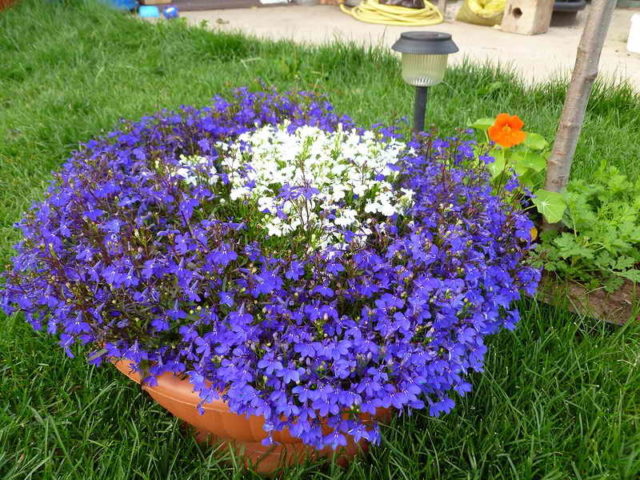
Lobelia buds bloom until late autumn
Petunia
Petunia seeds are sown on the substrate and are not even compacted with the soil. Good seed emerges in 13-15 days, sometimes longer. To harden fragile sprouts, petunia is kept for 6-8 days at a temperature not higher than 16 ° C.
A good result is obtained after placing petunia seeds in peat tablets. During germination, the container is covered with film or glass on top, ensuring stable humidity.
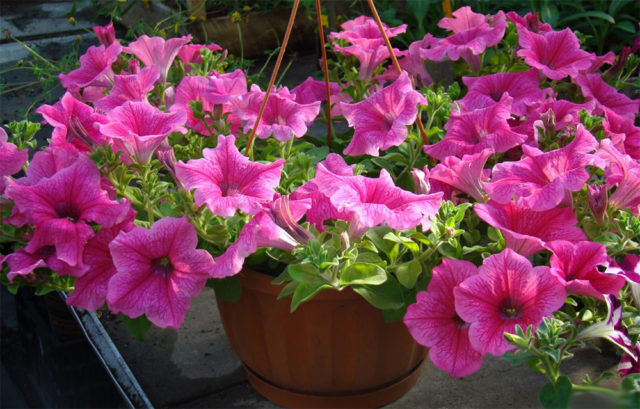
In January, ampelous and fringed petunias are planted
Antirrinum
The exuberant colors of the large antirrinum pleases in May-June after taking care of seedlings, starting in January. The substrate with seeds is kept in the light, but to maintain moisture, it is covered with film or glass. The sprouts appear in 1-2 weeks. Seedlings develop very slowly.
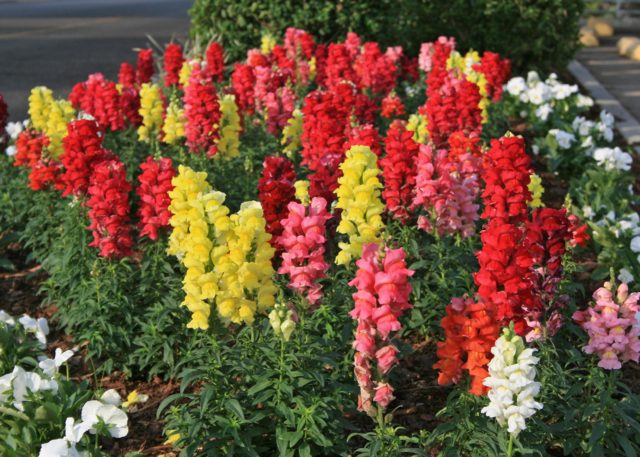
Snapdragon is light- and moisture-loving, cold-resistant
What other flowers are planted for seedlings in January
Many plants develop over a long period. After sowing them in January and growing strong and resistant seedlings, they enjoy early flowering. Levkoi, gerberas are sown in January, gatzania, balsam, heliotrope, graceful groundwort, euphorbia, bell, helenium, Gaillardia and other cultures.
Professional advice
Among the most common rules for sowing flowers in January for seedlings is shallow sowing of small seeds. Many cultures also require stratification. The following factors play a huge role in the development of seedlings:
- lighting with phyto- and fluorescent lamps for 12-14 hours;
- air humidification;
- if the plant has a taproot, peat tablets are used for the substrate;
- watered in moderation;
- once a month, the substrate is spilled with a solution of potassium permanganate for disinfection;
- in the initial period, the seedlings are hardened at 16-18 ° C.
Conclusion
It is important to sow seedlings in January with knowledge of the peculiarities of the awakening of seeds of various crops. They also study the specifics of growing seedlings so that the plants develop well.








